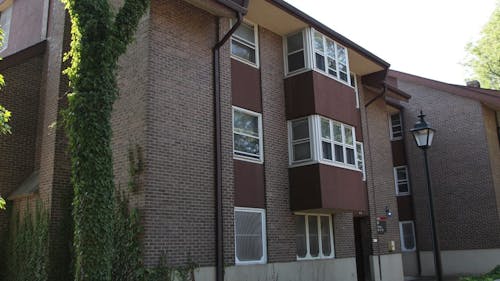COMMENTARY: Rutgers' priorities are all mixed up
Commentary

The only thing Rutgers football loses more than sports games is money. Since joining the Big Ten Conference back in 2014, the University’s athletic department has accumulated $265 million in debt, with almost $125 million of an operating deficit having built up over the past two years.
This information comes via a report published by NorthJersey.com and was later summarized by the Rutgers American Association of University Professors and American Federation of Teachers (AAUP-AFT), which went on to further detail how Rutgers Athletics diverted resources from other areas of the budget to funnel into sports in such a way as to violate NCAA guidelines. The Athletics department was aided in doing so by top notch accountants and lawyers hired by the then-University administration.
The report also cited other figures, such as Rutgers Athletics having received almost $500 million of funding from tuition, student fees and taxpayer support, and that over the pandemic, Rutgers laid off upwards of 1,000 staff members, reportedly affecting women and people of color on a disproportionate level.
One aspect the AAUP-AFT’s report failed to mention which could certainly use some improvement was Rutgers' housing. As a current University resident living on the Cook campus, I can personally report that life at the Newell Apartments is far from ideal.
Complaints of faulty plumbing leading to backed-up toilets appeared on the GroupMe chat for our section of the complex, while a window near my building, in particular, was a favorite spot for wasps to congregate, with a fair few finding their way inside the building itself.
Most glaring of all, though, was how the issue of heating was addressed. Initially, we were told via an email sent on September 23, 2022, that the air conditioning would be turned off October 1, 2022, and that heating would remain on until late in the Spring semester.
Needless to say, the heating was not, in fact, turned on as promised, and in actuality activated closer to October 7, 2022, even as temperatures dipped into the upper 30s, and we were told not to expect heat until the following week.
Although residents of the Newell Apartments endured near-freezing temperatures and potentially hazardous pests, students elsewhere across Rutgers—New Brunswick have had to put up with much worse. Specifically, those living at the New Gibbons Hall were greeted in September 2022 not just with the exciting prospect of a new academic year, but with a notice that their new home could potentially prove lethal.
In a handout titled "Asbestos in Housing FAQ," Rutgers was quick to excuse the hazardous substance’s presence, saying that "most buildings, including a majority of residence halls and apartments at Rutgers, constructed prior to 1980 contain asbestos.”
The information sheet goes on to say that "students residing in dormitories/apartments that contain asbestos ceilings receive notification letters advising them of the presence of asbestos in their building." This struck me as odd, and also perplexed one current resident, who said their resident assistant (RA) had provided contradictory information upon their arrival earlier this year.
Nova Okwei, a School of Arts and Sciences first-year student and resident of New Gibbons Hall, said that as they moved into their residence hall, the way their RA spoke about the asbestos notice made it seem as though it were a new practice.
"Many of the buildings are literally collapsing, and the whole goddamn asbestos notice … our RA was like 'Huh, this is the first time they’ve given a notice to the students,'" they said.
Rutgers, much like many institutions in the present day, tries to promote a message of support for the LGBTQ+ community. One of the forms this takes is through the existence of its "Rainbow Perspectives" housing community, which offers students accommodations such as gender neutral bathrooms and LGBTQ+ affirmative housing, among other amenities. On paper, this sounds like quite the move to promote inclusivity.
Try to act surprised, then, when I tell you that across its five campuses and with a student body of more than 40,000, only two buildings are designated as Rainbow Perspective housing, and of those two, the only option for first-year LGBTQ+ students is New Gibbons Hall.
"Being an ostracized party of society physically impacts your body," explained Okwei, as we sat in the notably non-handicap accessible Rutgers LGBTQ+ Cultural Center. "So you’re putting queer, disabled kids in dangerous housing without telling them. Lovely to know."
All of this is to say that I am sure the real reason Rutgers has not done anything substantial to address the problem of asbestos is primarily financial. Honestly — I kind of get it.
The home improvement blog, "Bob Vila," estimated earlier this year it would cost an average homeowner $1,853 to remove an asbestos ceiling, and if that is just the cost for one house, I can see why simply telling the comparatively small number of people living in a deemed problematic asbestos residence hall to not touch the ceiling would seem like the most cost efficient way of dealing with the problem.
But, when you are spending tens of millions of dollars per year just to consistently make a fool of yourself on the Big Ten Network. I just cannot help but wonder if you should maybe reassess where your priorities are.
YOUR VOICE | The Daily Targum welcomes submissions from all readers. Due to space limitations in our print newspaper, letters to the editor must not exceed 500 words. Guest columns and commentaries must be between 700 and 850 words. All authors must include their name, phone number, class year and college affiliation or department to be considered for publication. Please submit via email to oped@dailytargum.com by 4 p.m. to be considered for the following day’s publication. Columns, cartoons and letters do not necessarily reflect the views of the Targum Publishing Company or its staff.



